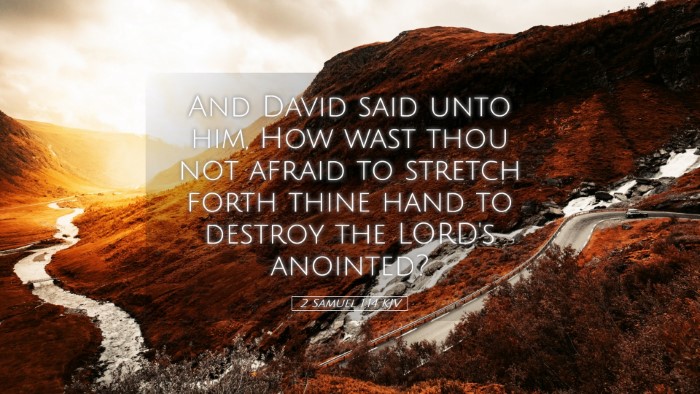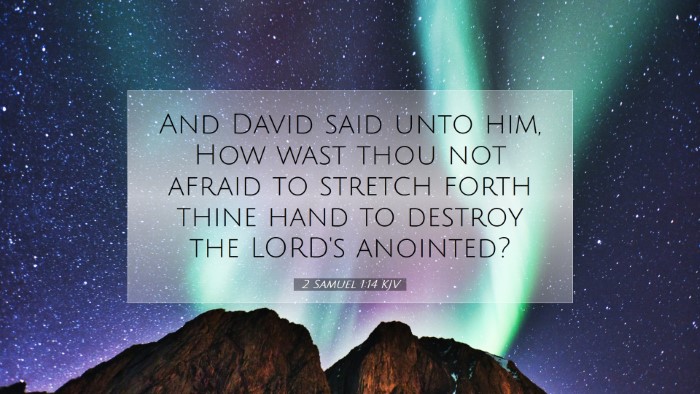Commentary on 2 Samuel 1:14
Verse: "And David said unto him, How wast thou not afraid to stretch forth thine hand to destroy the Lord's anointed?"
Introduction
This verse emerges at a pivotal moment in the narrative of 2 Samuel, as David learns of Saul's death and the circumstances that surround it. Here, David confronts an Amalekite who claims to have killed Saul—a claim laden with theological and moral implications. The commentary on this verse draws from multiple esteemed public domain authors including Matthew Henry, Albert Barnes, and Adam Clarke, offering deep insights for scholars, pastors, and students of Scripture.
The Context of the Verse
The backdrop of 2 Samuel 1 is critical to understanding the gravity of David’s question to the Amalekite. Following years of Saul’s pursuit to kill David, this moment marks a transition in leadership in Israel. David’s question reveals more than mere disbelief; it reflects the theological significance of God’s anointed representatives.
- The Death of Saul: Saul's demise is not simply a political shift but a deep personal and spiritual crisis.
- The Amalekite's Claim: His claim to have killed Saul, if true, indicates a profound disregard for God's anointed.
- David’s Leadership: This moment is pivotal in establishing David's character as a future leader who honors God’s choices.
Commentary Insights
Matthew Henry
Matthew Henry emphasizes that David’s astonishment at the Amalekite’s lack of fear illustrates a fundamental principle: taking the life of God’s anointed is an act that incurs divine judgment. Henry notes that the Amalekite sought to gain favor by boasting of his vile deed, unaware that his act was an affront to God’s sovereignty over kingship in Israel.
Albert Barnes
Albert Barnes focuses on the societal implications of the Amalekite’s actions. He remarks that the Amalekite misjudged the political ramifications of his claim, as David’s response underscores an essential respect for God’s chosen leaders. Barnes insists that David’s response serves as a timeless reminder of the sacredness of God’s appointments and invites reflection on how leaders today must uphold integrity and respect for divine authority.
Adam Clarke
Adam Clarke dives deep into the moral and ethical dimensions of this confrontation, drawing attention to the concept of fear in the face of divine authority. He points out that the Amalekite’s audacity to slay the anointed one of God reveals a troubling moral depravity. Clarke observes that true service to God involves reverencing His anointed, and he encourages readers to consider how they approach authority within their own faith communities.
Theological Implications
The question posed by David—“How wast thou not afraid?”—serves to confront the reader with the reality of accountability before God. Our respect for authority figures, especially those set apart for God’s work, reflects our understanding of divine order. This verse acts as both a historical indictment of the Amalekite and a timeless exhortation for all believers today.
- Fear of the Lord: Proper fear of God encourages respect for His appointed leaders.
- Accountability in Leadership: Leaders ought to recognize their divine appointment and the weight it carries.
- Honor Among Believers: Esteeming one another in the faith community is vital for harmony and spiritual growth.
Application for Today's Context
In contemporary ministry, this verse is relevant as leaders are often questioned for their authority or decisions. Pastors and church leaders are challenged to emulate David’s respect for God's anointed, even in the face of difficulty or controversy. Students and scholars should reflect on how this call to respect divine authority can influence their engagement with both Scripture and church governance.
Conclusion
2 Samuel 1:14 challenges believers to honor God’s anointed in all forms—whether in church leadership or wider societal roles. The combined insights from Henry, Barnes, and Clarke highlight the multifaceted nature of this inquiry into fear, respect, and accountability in accordance with divine will. As we study this text, may we be reminded of our commitment to uphold God's appointed authority and navigate leadership with integrity and humility.


